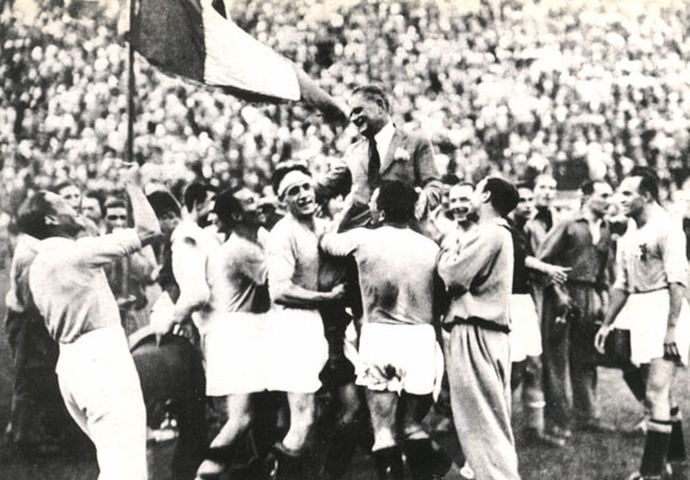Backed by the passionate home crowd & led by their fascist dictator Benito Mussolini, Italy won their first-ever World Cup defeating Czechoslovakia in the final. With this, they made it two title wins for hosts in two world cups with Uruguay winning it four years back. The 1934 World Cup mixed sports and politics. Let’s have a look at what happened.
While the world was in the death grip of the worst economic depression in history in the summer of 1934, fascist Italy hosted the second FIFA World Cup in what remains the only edition where the host nation was required to qualify. Although there was an even number of teams (16), there was no opening group stage. Instead, the tournament was a knockout competition from the start: if you lost, you went home. Games went to extra time if the teams were tied after 90 minutes, and a replay (another game) if they were tied after 120 minutes. There were no penalty shootouts. Sixteen teams – 12 from Europe, three South Americans (though not the holders Uruguay) and one from Africa, Egypt – lined up for the finals.
A regular spectator at Rome’s Nazionale stadium during the second World Cup, Il Duce (Mussolini) made the tournament his Berlin Olympics, using the competition to showcase Italy and trumpet his Fascist regime to the world, while at the same time uniting the country behind the national team. The Italian dictator apparently wasn’t shy about intimidating the match officials. Referee Ivan Eklind was said to have met with Mussolini prior to taking charge of Italy’s semifinal and final games, leading many to believe the Swede made several disputed calls in the Italians’ favour. One of the more hard-fought contests was the quarterfinal between Italy and Spain. It was one of the most physical games of the tournament and Belgian referee Louis Baert, “let many fouls go unpunished.” Many argue that this officiating played to the favour of the Italians. Gianni Brera, an Italian football journalist, later wrote of the match, “the referee Baert behaved as if he was well aware where the game was taking place.” The match ended in a one to one tie. Questions of biased officiating escalated with the replay of the quarterfinal—the first replay in World Cup history—where the game-winning goal by Guisseppe Meazza could have been disallowed.
All of Italy stood still on June 10 when Mussolini’s Azzurri and Czechoslovakia clashed in the final in Rome. It was a matchup that pitted teams with different styles: the Czechs displaying great skill and style with their short-passing game, and the Italians showcasing their stamina and strength. Both sides launched countless attacks, only to be thwarted. Finally, in the 70th minute came the breakthrough — winger Antonin Puc took a corner kick, and when the ball found its way back to him, he hammered it past Italian goalkeeper Giampiero Combi to make it 1-0 for the Czechs. Czechoslovakia should have put the game away minutes later, but Jiri Sobotka squandered a scoring chance and Frantisek Svoboda’s shot slammed against the post. The Czechs paid for their poor finishing. With nine minutes remaining in regulation, Argentine-born Enrico Guaita fed a pass to fellow Argentine Raimundo Orsi. The winger split the defence and beat Czech goalkeeper Frantisek Planicka with a right-footed curler after feigning with his left to tie it 1-1. Ninety minutes of furious action left both teams exhausted. Italy, though, was in far more trouble as the game went into extra time. Forward Angelo Schiavio looked tired in the waning minutes of regulation, while Giuseppe Meazza was limping. And yet, it was the Italians who broke the deadlock, conjuring a goal of pure magic in the 95th minute. The Czechs did not bother to mark the injured Meazza, and he made them rue that decision when he crossed to Guaita from the wing. Guaita passed to the tired Schiavio, who found open space after rounding Czech defender Josef Ctyroky and fired past Planicka.
Mussolini stood and applauded his Azzurri from the stands. After the match, Mussolini’s newspaper Il Popolo d’Italia described the moment, “In the name and in the presence of the Duce, the Azzurri win a new world title.”This World Cup triumph would be but one in a string for Italy who went on to win the gold medal in football at the 1936 Olympics in Berlin and become the first repeat champions in World Cup history with a victory in 1938. Italians will forever cherish this golden period in their football history.
![]()

